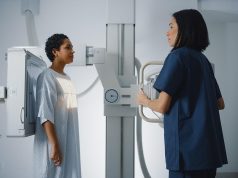Management approach to these findings includes axillary ultrasound if clinical concern persists six weeks after final dose of vaccine
MONDAY, March 1, 2021 (HealthDay News) — In two reports published recently in the American Journal of Roentgenology, radiologists address the clinical features of axillary adenopathy seen on breast imaging after COVID-19 vaccination and provide a detailed approach to manage these findings and avoid confusion among patients and clinicians.
Shabnam Mortazavi, M.D., M.P.H., from the University of California Los Angeles, conducted a retrospective study to identify women with axillary adenopathy detected during screening or diagnostic breast imaging after recent COVID-19 vaccination from December 2020 to February 2021. Mortazavi found that 23 women exhibited axillary adenopathy ipsilateral to the vaccinated arm. Of these, 13 percent were symptomatic (axillary lump with possible tenderness), 43 percent were detected incidentally on screening breast imaging, and 43 percent were detected on diagnostic imaging for other reasons.
Constance D. Lehman, M.D., Ph.D., from the Avon Comprehensive Breast Evaluation Center at Massachusetts General Health in Boston, and colleagues propose a pragmatic management approach for axillary adenopathy identified on breast imaging after COVID-19 vaccination. The authors note that with no imaging findings beyond unilateral axillary adenopathy ipsilateral to recent vaccination, the adenopathy was reported as benign; if no nodes are palpable after the last dose, no further imaging is indicated. Clinical follow-up of the axilla is recommended for those with palpable axillary adenopathy. In these scenarios, if clinical concern persists six weeks after vaccination, axillary ultrasound is recommended. Prompt recommended imaging is encouraged as well as vaccination (in the thigh or contralateral arm) in patients with recent breast cancer diagnosis in the pretreatment or peritreatment setting.
“In addition to avoiding delays in vaccinations and breast cancer diagnoses, we hope that our model will reduce patient anxiety, health care provider burden, and costs of unnecessary evaluations of enlarged lymph nodes after vaccinations,” Lehman said in a statement.
One author from the Lehman study disclosed financial ties to the medical device and medical technology industries.
Abstract/Full Text – Mortazavi
Abstract/Full Text – Lehman
Copyright © 2020 HealthDay. All rights reserved.








